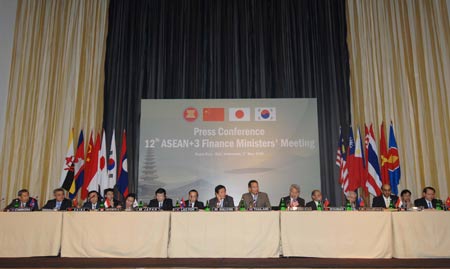Details of a sizeable foreign currency reserve pool among the Association of Southeast Asian Nations, China, Japan and South Korea (ASEAN+3) were finalized here on Sunday, two years after the initiative was first introduced to combat emergent financial problems.
Finance ministers of the ASEAN+3 nations reached the agreement on all main components of regional reserve pool, known as Chiang Mai Initiative Multilateralization (CMIM), and it will be implemented before the end of this year.
 |
|
A joint press conference of finance ministers of the Association of Southeast Asian Nations, China, Japan, and South Korea (ASEAN+3), is held in Bali, Indonesia, May 3, 2009. |
The agreement on the CMIM includes "the individual country's contribution, borrowing accessibility, and the surveillance mechanism," said a statement issued after the finance ministers' meeting.
The total size of the CMIM is 120 billion U.S. dollars with the contribution portion between ASEAN and the Plus Three countries at 20 percent versus 80 percent.
China and Japan will each contribute 38.4 billion U.S. dollars to the pool, while South Korea will contribute 19.2 billion dollars.
Among China's portion, Hong Kong Special Administrative Region will contribute 4.2 billion U.S. dollars. "We welcome Hong Kong, China, to participate in the CMIM," said the statement.
The CMIM is set up to "address short-term liquidity difficulties in the region and to supplement the existing international financial arrangements," the statement said.
The ministers agreed to establish an independent regional surveillance unit to monitor and analyze regional economies and support CMIM decision-making. As a start, there would be an advisory panel of experts to work closely with the Asian Development Bank (ADB) and the ASEAN Secretariat.
In the statement, the ministers also endorsed the establishment of the Credit Guarantee and Investment Mechanism (CGIM) as a trust fund of the ADB with an initial capital of 500 million U.S. dollars. It could be increased once the demand is fully met.
"It's a welcoming step in coping with the crisis, and an important step to the financial architecture of the region and it will infuse confidence to the market," said ADB Managing Director General Rajat Nag after the meeting, referring to the finalization of the CMIM.
Asked whether the CMIM is meant to replace the role International Monetary Fund plays in the region, he said the mechanism is only "good complement" to what IMF does.
"Gladly, we don't have the situation like in the U.S. or Europe but it's better to be prepared. Once there is a need, we are able to present our concerns and there is facility there," said Philippine Finance Secretary Margarito B. Teves." It is a helpful matter for the market."
"It's done, there would be no blocking stone toward the final implementation of reserve pool," said Thai finance minister Korn Chatikavanij.
(Xinhua News Agency May 4, 2009)